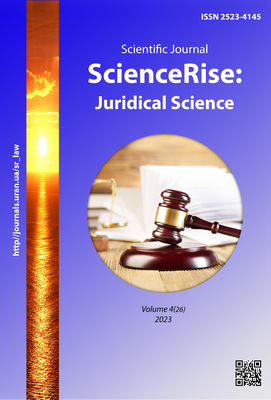Effective salary policy as a component of the development strategy
DOI:
https://doi.org/10.15587/2523-4153.2023.294285Keywords:
exchange rate, taxes, progressive rates, labor productivity, profitAbstract
The inefficient distribution of income in society creates a number of problems, the main of which are the following: approved social standards are at least two times lower than the actual value of the minimum consumer basket, half of the Pension Fund's income is formed at the expense of subsidies, and half of the country's households need subsidies to pay for housing and communal services. As a result, there is no solvent demand for goods and services on the market, which slows down the socio-economic development of the state. The need for radical improvement of the principles of income distribution in society determines the relevance of the research topic. The task is to determine the legal means of effective distribution of income in order to accelerate the socio-economic development of the state. The drivers of economic growth based on wages and/or profits of enterprises are analyzed. However, none of the possibilities will be realized in the absence of a stable or at least predictable exchange rate of the hryvnia, a progressive income tax system and fair market prices. The socialist ideology of the connection of wages with labor productivity, which is equated with labor intensity, does not allow to implement the optimal distribution of incomes and restrains the socio-economic development of the state. Labor productivity is determined by the level of production equipment and technology, the progressiveness of technological processes, the use of innovative materials, the introduction of patents and know-how, etc., which provides for higher qualification of personnel and higher wages and determines the direction of using the received profits and attracting investments. The regulator of the use of profits is the tax system and progressive tax rates. Income distribution in society should be determined by acceptable social standards and ensured by the application of progressive personal income tax rates. Amendments to the Tax Code of Ukraine have been proposed, which will ensure the solution of the set tasks
References
- Blecker, R. A., Setterfield, M. H. (2019). Macroeconomics: Models of Demand, Distribution and Growth. New York: Edward Elgar Publishing.
- Keynes, J. M. (2007). The General Theory of Employment, Interest and Money. London: Palgrave Macmillan.
- Rossi, P., Gonçalves, R., Ping, Z. (2022). Progressivity and distributive impacts of personal income tax: the case of China and Brazil. Brazilian Journal of Political Economy, 42 (4), 998–1013. https://doi.org/10.1590/0101-31572022-3323
- Oreiro, J., Araujo, E. (2013). Exchange rate misalignment, capital accumulation and income distribution: Theory and evidence from the case of Brazil. Panoeconomicus, 60 (3), 381–396. https://doi.org/10.2298/pan1303381o
- Holovnov, S. (2022). Syrovynna ekonomika Shcho kupuvala i prodavala Ukraina v 2021 rotsi. Biznes tsenzor. Available at: https://biz.censor.net/resonance/3310713/syrovynna_ekonomika_scho_kupuvala_i_prodavala_ukrayina_v_2021_rotsi
- Podatkovyi kodeks Ukrainy 2755-VI. 02.12.2010. Available at: https://zakon.rada.gov.ua/laws/show/2755-17#Text
- Pyroha, I. S., Pyroha, S. S. (2012). Derzhavne rehuliuvannia ekonomiky: vid protyvah do konsensusu. Lutsk: «Vezha», 206.
- Feital, T. A. (2021). Tax regressivity as indirect discrimination: An analysis of the Brazilian tax system in light of the principle of non-discrimination. Revista De Informação Legislativa, 58 (230), 219–243.
- Konventsiia Mizhnarodnoi orhanizatsii pratsi N 131 pro vstanovlennia minimalnoi zarobitnoi platy z osoblyvym urakhuvanniam krain, shcho rozvyvaiutsia (1970). Available at: https://zakon.rada.gov.ua/laws/show/993_149#Text
- Pro oplatu pratsi (1995). Zakon Ukrainy No. 108/95-VR. 24.03.1995. Available at: https://zakon.rada.gov.ua/laws/show/108/95-%D0%B2%D1%80
- Pyroha, I. S. (2018). Minimum consumer budget: legal definition. Aktualni problemy pravoznavstva, 2 (14), 59–64.
- Pro Derzhavnyi biudzhet Ukrainy na 2021 rik (2020). Zakon Ukrainy No. 1082-IX. 15.12.2020. Available at: https://zakon.rada.gov.ua/laws/show/1082-20#Text
- Prozhytkovyi minimum u tsinakh veresnia 2021 roku (2021). Profspilka pratsivnykiv osvity i nauky. Available at: https://pon.org.ua/novyny/9047-prozhytkovyi-minimum-u-cinakh-veresnia-2021-roku.html
- Konventsiia pro minimalni normy sotsialnoho zabezpechennia No. 993_11. 28.06.1952 (1952). Available at: https://zakon.rada.gov.ua/laws/show/993_011#Text
- Pyroha, I. S. (2018). Konstytutsiini harantii sotsialnykh standartiv ta spromozhnist ekonomiky. Visegrad Journal on Human Rights, 1, 149–154.
- Pro ratyfikatsiiu Yevropeiskoi sotsialnoi khartii (perehlianutoi) (2006). Zakon Ukrainy No. 137-V. 14.09.2006. Available at: https://zakon.rada.gov.ua/laws/show/137-16#Text
- Pro zapobihannia koruptsii (2014). Zakon Ukrainy No. 1700-VII. 14.10.2014. Available at: https://zakon.rada.gov.ua/laws/show/1700-18#n2
Downloads
Published
How to Cite
Issue
Section
License
Copyright (c) 2023 Serhii Pyroha

This work is licensed under a Creative Commons Attribution 4.0 International License.
Our journal abides by the Creative Commons CC BY copyright rights and permissions for open access journals.
Authors, who are published in this journal, agree to the following conditions:
1. The authors reserve the right to authorship of the work and pass the first publication right of this work to the journal under the terms of a Creative Commons CC BY, which allows others to freely distribute the published research with the obligatory reference to the authors of the original work and the first publication of the work in this journal.
2. The authors have the right to conclude separate supplement agreements that relate to non-exclusive work distribution in the form in which it has been published by the journal (for example, to upload the work to the online storage of the journal or publish it as part of a monograph), provided that the reference to the first publication of the work in this journal is included.








